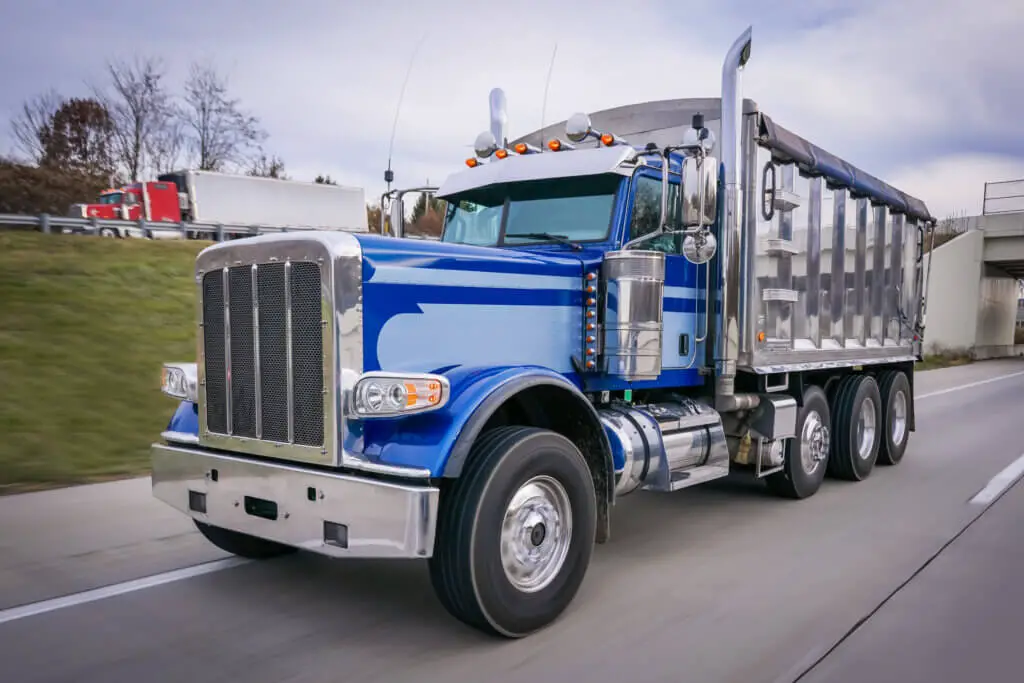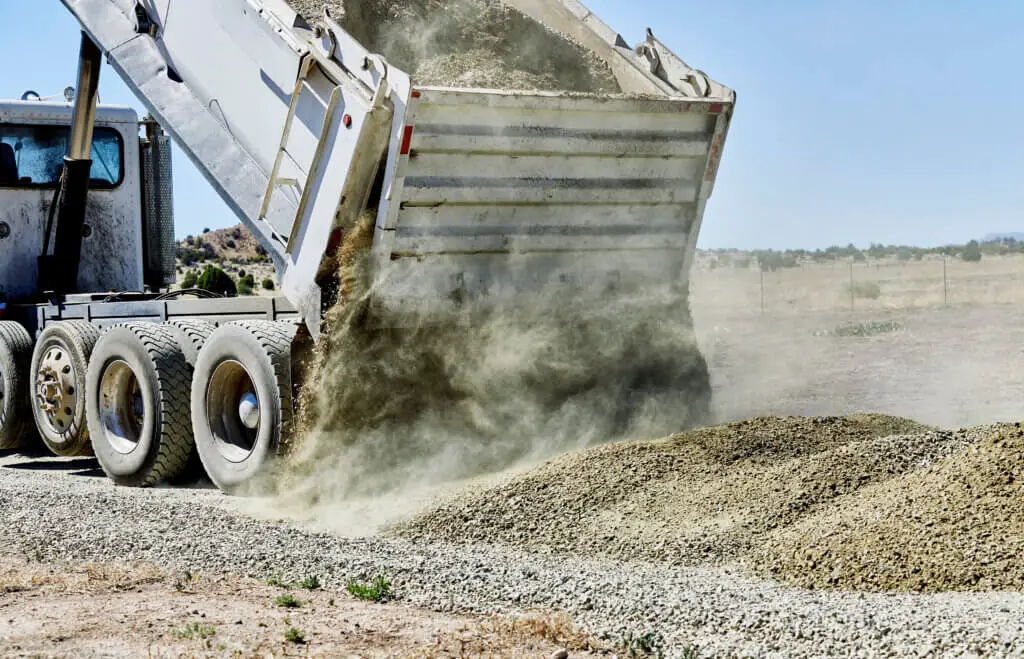Do you crave a more hands-on, active career that offers good pay and benefits? If so, have you ever considered dump truck driving?
Dump truck driving is a challenging and rewarding career that offers a range of benefits, from a competitive salary to opportunities for advancement. But it’s not for everyone. Before you start pursuing this career, it’s important to understand the requirements, salary, pros, and cons of the job, so you can make an informed decision about whether it’s the right career path for you.
So, keep reading to learn more about dump truck driving and whether it could be the perfect career for you.
What is a Dump Truck?

A dump truck is a heavy-duty vehicle designed to transport and unload materials. It has a hydraulic bed or hopper that can be raised or tilted to dump its load. Dump trucks are commonly used in the construction industry to haul dirt, gravel, sand, and other materials to and from job sites.
Dump truck driving is a specialized type of driving that requires unique skills and expertise. It is a challenging yet rewarding career that involves transporting and delivering different types of loads to various locations.
Types Of Dump Trucks
There are several types of dump trucks, each with its unique features and capabilities. The most common types include:
1. Standard Dump Truck
This is the most common type of dump truck, and it has a hydraulic ram that lifts the bed from the front.
2. Articulated Dump Truck
This type of dump truck has a hinge between the cab and the bed, allowing it to maneuver over rough terrain.
3. Transfer Dump Truck
This type of dump truck has a separate trailer that can be uncoupled and dumped independently.
4. Superdump Truck
This type of dump truck can carry more weight than a standard dump truck because of its additional axles.
Different Uses Of Dump Trucks

Dump trucks are used for various tasks, primarily in the construction industry. They transport and deliver materials to job sites, remove debris and waste materials, and excavate materials from the ground. They are also used in the mining industry to transport ore and minerals.
Dump trucks can carry a variety of materials, including sand, gravel, rocks, dirt, asphalt, and construction debris.
The type of load carried depends on the job requirements and the industry in which the dump truck is being used. For example, a dump truck in the mining industry typically carries large quantities of ore or minerals. In contrast, a dump truck used in construction may carry sand, gravel, or other construction materials.
Requirements for Dump Truck Driving
Just like in every field, some requirements are necessary before you can become a dump truck driver:
Legal Requirements For Driving A Dump Truck
Driving a dump truck requires individuals to meet specific legal requirements. To operate a dump truck for non-commercial purposes, a driver must have a current driver’s license and be at least 18 years old. However, to operate a dump truck for business, a driver must be at least 21, obtain a commercial driver’s license (CDL), and fulfill several conditions, including completing a background check and medical test.
Physical Requirements For Driving A Dump Truck
Dump truck driving is a physically demanding job that requires drivers to be in good physical condition. Drivers must be able to climb in and out of the truck, operate the controls, and handle heavy loads. They must also have good hand-eye coordination, be able to react quickly, and have good hearing and vision.
Licensing Requirements For Dump Truck Driving
To drive a dump truck, individuals must possess a valid driver’s license. However, if the dump truck is being used for commercial purposes, a CDL is required. To obtain a CDL, individuals must pass a written knowledge test, a skills test, and a medical exam. They must also have a clean driving record and meet specific age and residency requirements.
Educational Requirements For Dump Truck Driving
Dump truck driving does not require formal education beyond a high school diploma or equivalent. However, some employers may prefer candidates with a post-secondary education in a related field, such as automotive technology or diesel mechanics. Additionally, individuals may benefit from completing a commercial driving school program to gain additional training and experience.
Special Skills Needed For Dump Truck Driving

Driving a dump truck requires individuals to possess specific skills beyond basic driving skills. These skills include the ability to safely load and unload materials, navigate challenging terrain, and operate the hydraulic controls of the truck. Drivers must also be able to communicate effectively with other workers on the job site and follow safety protocols to avoid accidents.
Salary for Dump Truck Drivers
If you are considering a career in dump truck driving, you may be wondering about the salary prospects of the profession. Here are some things to help you put your expectations together:
According to Statistics, the median annual salary for heavy and tractor-trailer truck drivers, which includes dump truck drivers, was $47,130 as of May 2020. The lowest 10 percent earned less than $30,470, while the highest 10 percent earned more than $80,120. Actual salaries for dump truck drivers may vary depending on the region, company, and other factors.
Several factors can affect the salary of dump truck drivers. For instance, the type of company they work for can make a difference in their pay. A large, established company may offer higher salaries and better benefits than a small, independent contractor.
Other factors that can affect salaries include the level of experience and skill of the driver, the location of the job, and the type of load they are hauling.
Dump truck drivers may be eligible for overtime pay if they work more than 40 hours per week. Overtime rates typically range from time-and-a-half to double pay.
Additionally, many companies offer benefits such as health insurance, retirement plans, and paid time off. The availability of these benefits can depend on the company’s size and policies.
Compared to other types of truck drivers, such as long-haul truck drivers, dump truck drivers generally earn slightly less, and long-haul truck drivers earn a median salary of $48,360 per year as of May 2020.
However, dump truck drivers often have more predictable schedules and work closer to home, which can appeal to some individuals.
Pros of Dump Truck Driving
Dump truck driving may not be the first profession that comes to mind when considering a career, but it offers many benefits that make it an attractive option for many people. Here are some pros of dump truck driving:
1. Job Availability
One of the most significant advantages of dump truck driving is the constant demand for drivers. Dump trucks are essential for construction, mining, and other industries, and as a result, drivers are always needed. This means that there is job security in this field, as well as opportunities for advancement.
2. Potential For High Pay
Dump truck driving can be a lucrative career, particularly for those who have experience and drive in high-demand locations. According to the Bureau of Labor Statistics, the median annual wage for heavy and tractor-trailer truck drivers, which includes dump truck drivers, is $47,130 as of May 2020. However, experienced drivers in certain areas can earn well above this amount.
3. Opportunity For Job Growth
Dump truck driving is a career with growth potential. Experienced drivers may have opportunities for advancement, such as becoming supervisors or managers. Additionally, those with a commercial driver’s license (CDL) may have a chance to transition into other types of truck driving, such as tanker truck driving or long-haul trucking.
4. Flexible Schedule
Dump truck drivers often have flexible schedules, mainly if they are self-employed or work for a small company. This can be a major advantage for those who want to work non-traditional hours or have family obligations requiring a flexible schedule.
5. Job Satisfaction
Many dump truck drivers report high levels of job satisfaction. Driving a dump truck can be a rewarding and challenging profession, particularly for those who enjoy working independently and who like the variety that comes with driving different routes and hauling different types of loads. Additionally, dump truck drivers may have the satisfaction of seeing the tangible results of their work as they transport materials that are used in construction or other projects.
Cons of Dump Truck Driving
Dump truck driving has its fair share of pros and cons. Here are some cons you should be aware of before considering this career path:
1. Long Hours And Time Away From Home
One of the biggest cons of dump truck driving is the long hours and time away from home that come with the job. Dump truck drivers often work long shifts that can stretch up to 12 hours per day, and they may have to work nights and weekends as well. This can make it difficult for drivers to spend time with their families and maintain a healthy work-life balance.
2. High Levels Of Stress
Dump truck driving can be a stressful job, especially when dealing with heavy traffic, tight deadlines, and demanding customers. Drivers must navigate busy roads and highways while carrying heavy loads, and they must also be able to handle unexpected situations such as road closures and accidents.
3. Risk Of Accidents And Injuries
Dump truck driving is a physically demanding job that involves operating large and heavy vehicles in challenging environments. As a result, there is a risk of accidents and injuries, especially when driving on uneven terrain, through inclement weather, or in busy construction sites. Drivers must always be vigilant and follow safety protocols to minimize the risk of accidents.
4. Physical Demands Of The Job
Dump truck driving is a physically demanding job that requires drivers to climb in and out of their vehicles, secure loads, and perform other manual tasks. Over time, this may hurt their health, resulting in back discomfort, joint problems, and other disorders. To keep fit and healthy, drivers need to lead a healthy lifestyle and exercise frequently.
5. Exposure To Harsh Weather Conditions
Drivers of dump trucks must be equipped to operate their vehicles in all types of weather, including intense heat, cold, rain, and snow. This can be uncomfortable and difficult, and it puts drivers at risk for illnesses like hypothermia, frostbite, and heat fatigue.
Wrapping Up
Dump truck driving can be a rewarding career choice for those who enjoy being on the road and working in the transportation industry. With a competitive salary and the potential for career growth, dump truck driving offers numerous benefits.
However, it’s essential to consider the job’s physical demands, potential risks, and other factors before making a decision to pursue this career path.
